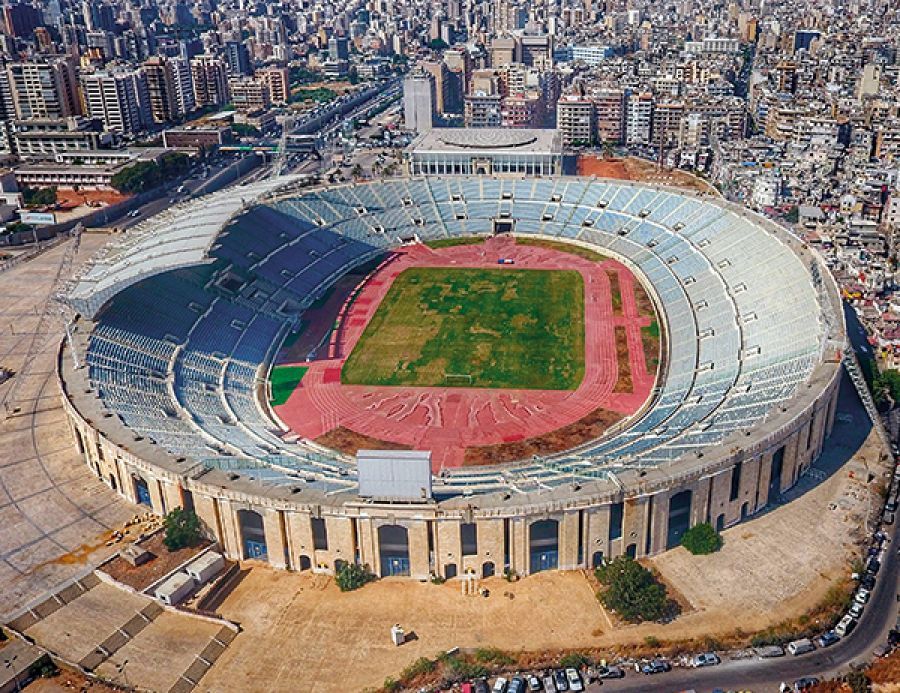
Camille Chamoun Sports City Stadium reopens its gates to the greatest classic of Lebanese football. Ansar vs Nejmeh is not just a match: it’s a ritual, a fever, an announced sports earthquake.
When history meets stakes, it becomes a clasico. And when the Lebanese clasico returns to the legendary pitch of Camille Chamoun Sports City, it becomes a special moment—suspended, almost sacred.
Shock Fixture
On Friday at 4:45 PM, thunder will rumble over Beirut. On the freshly restored green rectangle of the stadium, Al Ansar, current league leader with 29 points, challenges its eternal rival, Nejmeh, fifth in the standings but first in the hearts of thousands of supporters ready to set the stands ablaze. Because between these two monuments of Lebanese football, the standings don’t matter. It’s the match. The derby. The Clasico.
And this time, the clash goes beyond the pitch. Held under the high patronage of President Joseph Aoun, with the announced presence of Prime Minister Nawaf Salam, the encounter takes on an institutional, almost solemn tone. Lebanese football dons its ceremonial attire, and the grand mass of the beautiful game promises to be electric.
Journey of a Mythical Stadium
When Camille Chamoun inaugurated “his” Sports City in October 1957, he couldn’t have imagined the tumultuous destiny of this flamboyant complex, then presented as the showcase of Arab sports. Erected on the lands of Bir Hassan after long negotiations, the venue hosted more than 80,000 people from its opening during the Pan Arab Games. The grandeur of that era—fireworks, athlete parades, regional folklore—violently contrasts with the decades that followed. From Pelé to Ronaldinho, via Pavarotti, the stadium has welcomed football, music and entertainment legends. But it has also witnessed war, invasions, looting and abandonment.
Partially destroyed in 1982, left to decay during the Civil War, narrowly saved from being turned into a wholesale market, it was reborn in the 1990s thanks to Rafic Hariri, only to fall into oblivion again after the 2019 revolution. In the meantime, it became a flour warehouse, a makeshift hospital, then a dormitory for displaced persons. It has seen everything—even hosting the funeral of Hezbollah leader Hassan Nasrallah in 2025, in the presence of tens of thousands of supporters. That day, many of the builders of modern Lebanon must have turned in their graves.
Now more than ever, the Sports City is a faithful mirror of a country torn between grandeur and chaos, where public gathering places can shift, within a generation, from ovation to obsequy.
And yet, it is in this arena scarred by History that the fervor of popular football is reigniting today. The match between Nejmeh and Ansar, living myth of Beirut's passion, breathes new life into this place thought to be lost.
Sold-Out Stadium, Unleashed Passion
For several days now, mobilization has been in full swing. On social media, calls for unity, motivational videos, anthems and chants from the stands are circulating in loops. Convoys are being organized, flags are being prepared, tifos are being imagined. Ansar and Nejmeh supporters are mobilizing like they rarely have before. The Ministry of Youth and Sports, through Minister Nora Bayrakdarian, speaks of one of the year’s biggest popular gatherings.
The match itself is already on everyone’s mind. Security forces and organizing committees are fine-tuning a detailed plan to ensure smooth entry and exit of supporters, in a spirit of fair play and respect.
More Than a Match, A Symbol
In a tense Lebanon, this match feels like a parenthesis of unity and pride. The image of a vibrant, packed stadium resonates like a promise of cohesion. Because despite the rivalry, despite the tensions, football remains that common thread, that escape, that stage where one can believe, shout, hope.
Ansar wants to confirm its throne. Nejmeh wants to shatter the hierarchy. But deep down, they all want the same thing: for Lebanese football to regain its former glory.
No matter the score. On Friday, whoever wins, the true victory may belong to this legendary pitch, which, after surviving wars, neglect, and repurposing, proves it is still the beating heart of a standing Lebanon.

Comments